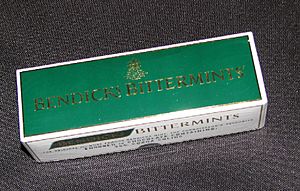Bendicks facts for kids
 |
|
| Industry | Confectionery |
|---|---|
| Founded | 1930 |
| Parent | August Storck |
Bendicks is a famous chocolate brand. It is currently owned by a company called August Storck KG. Bendicks is especially known for its "Bittermint" dark mint chocolates. These chocolates are still made using the original recipe from 1931. They are considered a very traditional British treat.
History of Bendicks
How Bendicks Began
In 1930, two friends, Oscar Benson and Colonel 'Bertie' Dickson, bought a candy business. It was located on Church Street in Kensington, London. The chocolates were made in a small basement below the shop. They combined parts of their last names, "Ben" from Benson and "Dicks" from Dickson, to create the name Bendicks.
The Famous Bittermints
In 1931, Oscar Benson's sister-in-law, Lucia Benson, created a unique dark chocolate. It was so bitter that it was hard to eat by itself. She also made a mint filling that was very strong with mint oil. When these two parts were put together, they made a delicious chocolate. They called it Bendicks Bittermints. The chocolate coating on these treats contains a very high amount of cocoa, 95%.
Becoming Bendicks of Mayfair
By 1933, Bendicks was becoming well-known for its high-quality chocolates. A new shop was opened in Mayfair, a fancy area in London. Many important people visited, including the Duke of Kent. He was the son of King George V and came specifically for the famous Bittermints. Soon after, the company became known as Bendicks of Mayfair.
Moving and Growing
In 1946, Mr. Edgar Lawley bought the business. By 1952, Bendicks moved to a new building in Winchester, Hampshire. This new location helped the company grow. In 1962, Bendicks received a special honor called the Royal Warrant. This meant they were officially approved to supply chocolates to "Her Majesty The Queen." This greatly improved the company's reputation.
At first, many chocolates were dipped by hand. This made the chocolate layer very thick. Bendicks also made other candies like nougat and chocolate bars. A fun fact about Bittermints was that you could buy them in very long boxes: 9-inch, 18-inch, and even 36-inch (which is "by the yard").
In 1967, the business moved to a factory built just for them in Winchester. Later, machines were brought in to help coat the chocolates. This allowed them to make many more chocolates.
Ownership Changes
In 1983, a company called Nabisco Brands bought Bendicks. Then, in 1988, a German candy producer named August Storck became the owner of Bendicks. Storck still owns Bendicks today.
Bendicks in the 21st Century
New Products and Changes
In 2002, Bendicks tried something new and introduced a chocolate selection box called Mingles. However, this product was not very successful.
On April 18, 2011, Storck announced a plan to move chocolate production from the factory in Hampshire, England, to Germany. This decision meant that 84 jobs were moved. About 30 marketing and sales jobs stayed in Winchester. Storck explained that this decision was made because the chocolate market was not doing well, and the English factory was not making enough profit.
Kosher Certification
In December 2023, Bendicks announced that they would no longer have their Kosher certification from the London Beth Din. This caused some concern in the Jewish community. Bendicks then clarified that their ingredients would not change. They simply could not continue the specific production process needed for the certification. However, in May 2024, Bendicks and the London Beth Din announced good news. After talking things over, Bendicks would continue to be Kosher-certified.
 | Stephanie Wilson |
 | Charles Bolden |
 | Ronald McNair |
 | Frederick D. Gregory |


